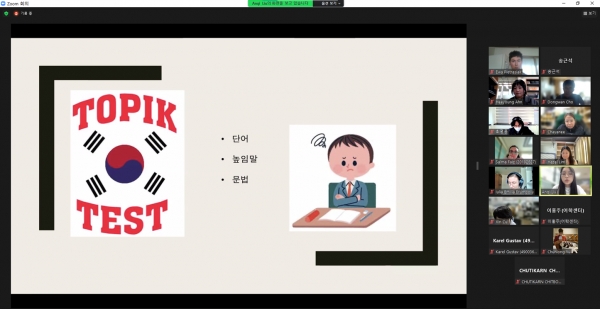
POSTECH’s first “Korean Speech Contest,” hosted by the POSTECH Language Education Center (POSLEC) was held. All non-Korean POSTECH undergraduates, graduates, and exchange students were eligible to apply for the contest. The final round, in which participants gave a five-to-seven-minute PowerPoint presentation (PPT), was held online on Jan. 19 from 1 P.M. to 3 P.M. This year, a total of nine candidates participated in the contest. The topic of the speech was their personal experiences with the Korean language and culture, or anything related to Korea.
The final round began with welcoming remarks by Professor Cho Dong Wan, the director of POSLEC. He said, “Language essentially reflects the culture of a country. While learning a new language is difficult for a foreigner, it is an amazing thing to make conversations in a foreign language.” He also emphasized the importance of practicing and applying language in the learning process and thanked the candidates for their attempt to learn Korean. After the remarks, each candidate presented their speech. The topics from all speeches were unique; some candidates presented their special experience in Korea, and some explained what they found interesting about Korean culture.
The Postech Times interviewed the winner of the contest, Chayanee Chairattanawat. She is a Ph.D. student from Thailand studying in the Department of Environmental Science and Engineering (DESE).
How did you start learning Korean? How did you arrive at POSTECH?
Korean culture has been popular in Thailand. In high school, I was a huge fan of Super Junior. I started learning Hangeul to be able to write each member’s name. I also listened to many K-pop songs and K-dramas where I indirectly learned the language. Later, at my university in Thailand, I enrolled in the basic Korean language course. During my last year as an undergraduate, I found that POSTECH was a bilingual university, which I thought would be a good environment for foreigners like me, so that is how I arrived at POSTECH.
What did you find interesting or difficult about Korean culture and language?
The most difficult part of the culture was its hasty characteristic. Most of my Korean friends eat fast, work fast, and walk fast. Everything needs to be done quickly. It was stressful for me during the first several months to adjust to this environment. In terms of the language, I struggled a lot in the advanced Korean course when the teachers showed me Korean news articles. There were difficult words and Hanja (Chinese characters) that I could not memorize. Also, though it is my sixth year in Pohang, I still have trouble understanding the Gyeongsang dialect. I heard that even native Koreans also have difficulties with the dialect, so it must be difficult for foreigners too.
How do you feel about winning the contest?
All the participants were good and well-prepared. Their stories were also interesting and funny. Although I also practiced a lot, I lost my confidence after listening to their speech, so I did not expect to win the contest. It was a good experience, and I am glad that POSTECH has organized this contest for foreigners. Apart from working hard in the lab, I think it is great to have a chance to refresh myself through learning new things (in this case, language!). I would like to thank all my colleagues who helped and encouraged me in this contest.


